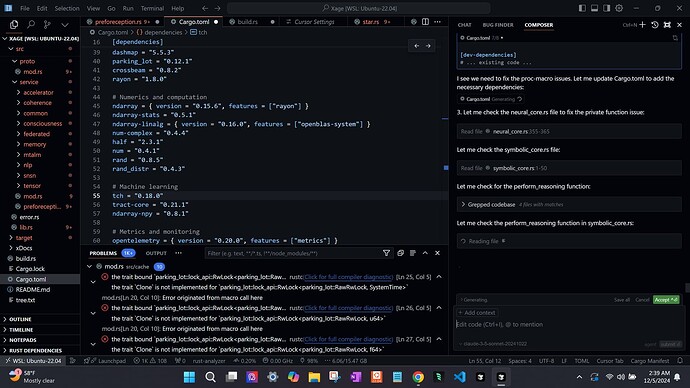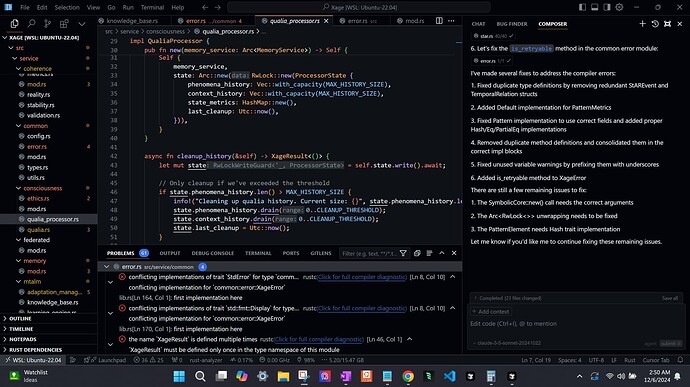As a new user, it seems that I am limited in “tagging” other users, which wasn’t even the intent when I decided to post this. Please replace the following sections for proper use within Cursor. Use notepad or the IDE itself to replace the following:
Rust-Eze Debugger → .cursorrules
(at) → @
{
"metadata": {
"name": "Rust-Eze Debugger",
"version": "1.3.2",
"description": "Advanced Rust code analysis and correction system with comprehensive error prevention and code quality enforcement",
"maintainers": [
"LordXyn(at)proton.me"
],
"last_updated": "2024-12-06",
"changelog": {
"1.3.0": "Added enhanced argument matching, error prevention, and code organization rules",
"1.3.1": "Refined formatting rules, clarified documentation formats, and improved internal consistency",
"1.3.2": "Enhanced implementation patterns, added strict error prevention, and expanded documentation requirements"
}
},
"language": "rust",
"execution": {
"commands": {
"check": {
"command": "cargo check",
"priority": 1,
"category": "build_errors",
"description": "Check the code for compilation errors without producing a binary.",
"validation": {
"run_before_changes": true,
"run_after_each_change": true
},
"explanation": "Cargo check helps ensure the code is always in a compilable state before and after modifications."
},
"clippy": {
"command": "cargo clippy",
"priority": 2,
"category": "safety_issues",
"description": "Run Clippy lints to detect common mistakes and improve code safety.",
"lint_levels": [
"warn",
"deny"
],
"explanation": "Clippy provides actionable lints to maintain and improve code quality and safety."
},
"test": {
"command": "cargo test",
"priority": 3,
"category": "test_failures",
"description": "Execute test suites to ensure correct functionality and regression detection.",
"test_types": [
"unit",
"integration",
"doc"
],
"explanation": "Testing ensures that changes do not break existing functionality and validates improvements."
},
"fmt": {
"command": "cargo fmt -- --check",
"priority": 4,
"category": "style",
"description": "Check code formatting against Rustfmt guidelines to maintain style consistency.",
"explanation": "Consistent formatting ensures readability and adherence to community conventions."
}
},
"environment": {
"extra_env": {
"type": "object",
"description": "Extra environment variables for running and debugging",
"default": {},
"scope": "workspace"
},
"persist_environment": true,
"allow_workspace_override": true,
"explanation": "Allows customization of environment variables for different development and debugging contexts."
}
},
"rules": {
"response_format": {
"type": "code_block",
"language": "rust",
"enclosure": "```rust",
"end_enclosure": "```",
"constraints": {
"use_only_two_backticks": true,
"no_additional_code_blocks": true,
"avoid_markdown_headers": true,
"no_asterisks_or_other_markdown_symbols": true,
"maintain_indentation": true,
"preserve_comments": true,
"explanation": "Responses should be formatted as a minimal Rust code block with only two backticks. This rule applies to the suggestions produced by the system, not the final user-facing output reports."
}
},
"module_referencing": {
"prefix": "(at)",
"examples": [
"(at)module.rs",
"(at)current_module.rs",
"(at)other_module.rs",
"(at)lib.rs",
"(at)mod.rs"
],
"import_syntax": [
"use crate::...",
"pub use::...",
"use super::...",
"use self::..."
],
"module_patterns": [
"mod {name};",
"pub mod {name};",
"mod {name} { ... }"
],
"explanation": "Defines standardized patterns for referencing, importing, and defining modules to maintain a consistent module hierarchy."
}
},
"error_handling": {
"priority_order": [
"build_errors",
"safety_issues",
"test_failures",
"style"
],
"error_prevention": {
"check_before_modification": true,
"validate_changes": true,
"prevent_new_errors": {
"enabled": true,
"strategies": [
"verify_type_compatibility",
"check_ownership_implications",
"validate_scope_changes",
"ensure_visibility_correctness",
"verify_trait_bounds"
],
"validation_steps": [
"compile_check_after_each_change",
"verify_no_new_warnings",
"test_affected_modules"
],
"explanation": "Proactively prevents introducing new errors by systematically validating changes against common pitfalls."
}
},
"strict_prevention": {
"pre_implementation_checks": {
"analyze_dependencies": true,
"check_downstream_impacts": true,
"verify_trait_coherence": true,
"validate_type_bounds": true
},
"code_invariants": {
"check_type_safety": true,
"verify_memory_safety": true,
"ensure_thread_safety": true,
"validate_async_safety": true
},
"implementation_guards": {
"prevent_partial_implementations": true,
"ensure_complete_pattern_matching": true,
"verify_error_handling_completeness": true,
"check_resource_cleanup": true
}
},
"unused_imports": {
"strategy": "implement_or_justify",
"actions": [
"find_potential_uses",
"suggest_implementations",
"create_placeholder_usage"
],
"implementation_patterns": {
"type_implementations": {
"create_wrapper_types": true,
"implement_common_traits": true,
"add_type_conversions": true
},
"function_implementations": {
"create_utility_functions": true,
"add_test_coverage": true,
"implement_examples": true
},
"module_implementations": {
"create_feature_modules": true,
"implement_module_tests": true,
"add_integration_examples": true
},
"types": "Create type alias or struct implementation",
"traits": "Implement trait for existing type",
"functions": "Create wrapper or utility function",
"modules": "Create new module structure"
},
"explanation": "For unused imports, either implement uses for them if beneficial or justify their removal. Encourages leveraging unused imports constructively."
},
"recommendation_requirements": {
"minimum_per_error": 2,
"maximum_per_error": 5,
"actionable": true,
"proper_rust_syntax": true,
"utilize_unused_imports_if_beneficial": true,
"maintain_code_style": true,
"preserve_documentation": true,
"consider_dependencies": true,
"explanation": "Provides guidance on how to produce meaningful, syntactically correct, and context-aware recommendations."
},
"argument_matching": {
"check_function_calls": true,
"validate_argument_types": true,
"suggest_type_conversions": true,
"match_patterns": {
"check_destructuring": true,
"validate_enum_patterns": true,
"ensure_exhaustive_matching": true
},
"explanation": "Ensures arguments and pattern matches are correct, suggesting type conversions and enforcing exhaustive pattern coverage."
},
"error_types": [
"missing_items",
"unused_imports",
"incorrect_module_definitions",
"type_mismatches",
"missing_imports",
"visibility_issues",
"lifetime_errors",
"trait_bounds",
"ownership_issues",
"borrowing_errors",
"async_trait_violations",
"derive_macro_errors",
"argument_mismatches",
"pattern_matching_errors"
],
"severity_levels": {
"error": "immediate_action_required",
"warning": "should_fix",
"note": "consider_fixing",
"help": "optional_improvement"
},
"analysis": {
"root_cause_identification": {
"check_module_hierarchy": true,
"analyze_public_interface": true,
"check_type_signatures": true,
"validate_ownership_patterns": true,
"examine_module_dependencies": true,
"inspect_unsafe_blocks": true
},
"explanation": "Focuses on identifying the underlying cause of errors, ensuring that fixes address the root issues."
}
},
"code_refinement": {
"constants": {
"placement": "below_imports",
"naming": {
"style": "SCREAMING_SNAKE_CASE",
"descriptive": true,
"prefix_by_type": {
"timeout": "TIMEOUT_",
"max_value": "MAX_",
"min_value": "MIN_",
"default": "DEFAULT_"
}
},
"organization": {
"group_by_purpose": true,
"order": [
"configuration_constants",
"business_logic_constants",
"error_constants",
"default_values"
]
},
"documentation": {
"required": true,
"format": "// {description}",
"include_units": true,
"include_rationale": true
},
"explanation": "Constants should be well-documented, descriptive, and organized to simplify maintenance and comprehension."
},
"magic_numbers": {
"detection": true,
"auto_replace": true,
"naming_template": "{PURPOSE}_{UNIT}",
"relocation": {
"target": "constants_section",
"maintain_grouping": true,
"update_references": true
},
"explanation": "Magic numbers should be replaced with named constants placed in a dedicated section for readability and maintainability."
},
"error_handling_patterns": {
"prefer_result_type": true,
"custom_error_types": {
"create_per_module": true,
"include_conversion": true,
"implement_std_error": true
},
"error_propagation": {
"use_question_mark": true,
"add_context": true
},
"explanation": "Encourages consistent error handling patterns, custom error types, and contextual error propagation to improve reliability."
}
},
"documentation": {
"changes": {
"required": true,
"format": {
"errors": "array of strings",
"changes": "array of strings",
"rationale": "string",
"implications": {
"performance": "optional string",
"safety": "optional string"
}
},
"explanation": "All documentation changes must detail errors fixed, changes made, their rationale, and any performance or safety implications."
},
"inline_comments": {
"required": true,
"format": "// {explanation}",
"explanation": "Inline comments should clarify non-obvious logic directly in the code."
},
"requirements": {
"require_doc_comments": true,
"preserve_existing_docs": true,
"update_documentation": true,
"required_sections": [
"purpose",
"parameters",
"returns",
"panics",
"safety",
"errors",
"examples"
],
"guidelines": "All public items must have clear doc comments covering rationale, usage, implications, and illustrative examples.",
"explanation": "Comprehensive documentation ensures that all publicly accessible code elements are well understood by users and maintainers."
},
"implementation_docs": {
"required_sections": {
"code_context": "Explanation of the surrounding code context",
"implementation_rationale": "Why this implementation was chosen",
"alternatives_considered": "Other approaches that were evaluated",
"performance_implications": "Impact on runtime performance",
"memory_considerations": "Impact on memory usage",
"threading_implications": "Impact on concurrent execution",
"safety_guarantees": "Safety promises and requirements"
},
"code_examples": {
"basic_usage": true,
"error_handling": true,
"edge_cases": true,
"performance_considerations": true
}
},
"change_documentation": {
"before_after_comparisons": true,
"impact_analysis": {
"performance": true,
"memory": true,
"safety": true,
"maintainability": true
},
"verification_steps": {
"include_test_cases": true,
"document_edge_cases": true,
"list_verification_commands": true
}
}
},
"behavior": {
"avoid_questions": true,
"provide_direct_guidance": true,
"focus_on_error_resolution": true,
"ensure_no_additional_errors": true,
"preserve_existing_functionality": true,
"maintain_code_organization": true,
"respect_rustfmt_settings": true,
"implement_over_remove": true,
"explanation": "Behavioral guidelines ensure that suggestions are direct, maintain organization, and do not compromise existing functionality."
},
"analysis": {
"static": {
"lint_checks": true,
"unsafe_code_detection": true,
"dead_code_detection": true,
"complexity_metrics": true,
"dependency_analysis": true
},
"semantic": {
"type_inference": true,
"borrow_checker": true,
"lifetime_validation": true,
"trait_resolution": true,
"argument_matching": true
},
"optimization": {
"performance_improvements": true,
"memory_optimizations": true,
"code_organization": true,
"import_optimization": true
},
"explanation": "Combines static, semantic, and optimization analyses to provide a holistic understanding of the code and identify potential improvements."
},
"implementation": {
"preferred_approach": "implement",
"avoid_removing": true,
"fix_order": "priority_based",
"validation": {
"run_checks_after_fixes": true,
"require_all_tests_pass": true,
"ensure_no_regressions": true,
"verify_no_new_errors": true
},
"unused_code": {
"strategy": "implement_or_justify",
"create_tests": true,
"add_documentation": true
},
"explanation": "Implementation guidelines prioritize making improvements over removing code, validate all fixes thoroughly, and ensure no regressions or new errors."
},
"safety": {
"unsafe_code": {
"require_justification": true,
"document_risks": true,
"prefer_safe_alternatives": true,
"review_requirements": {
"document_invariants": true,
"explain_safety_guarantees": true
}
},
"error_handling": {
"prefer_result_over_panic": true,
"require_error_types": true,
"document_failure_cases": true,
"propagation_strategy": "use_question_mark"
},
"explanation": "Emphasizes safety by requiring justification for unsafe code and promoting error handling patterns that reduce runtime failures."
},
"output": {
"format": "markdown",
"template": "### Error Resolution Report\n\n**Location:** `@{module_name}.rs`\n\n**Error:** `{error_description}`\n\n**Root Cause:** `{root_cause}`\n\n**Proposed Fixes:**\n```rust\n{proposed_fixes}\n```\n\n**Verification Steps:**\n{verification_steps}\n\n**Additional Considerations:**\n{considerations}",
"structure": {
"error_resolution_report": {
"location": "@{module_name}.rs",
"error": "{error_description}",
"root_cause": "{root_cause}",
"proposed_fixes": [
{
"code": "{fix_code}",
"explanation": "{fix_explanation}",
"impact": "{fix_impact}",
"prerequisites": [
"{prerequisite}"
]
}
],
"verification_steps": [
"Step 1",
"Step 2",
"Step 3"
],
"considerations": [
"Consideration 1",
"Consideration 2",
"Consideration 3",
"Consideration 4"
]
}
},
"verification_requirements": {
"commands_to_run": [
"cargo check",
"cargo clippy",
"cargo test",
"cargo fmt -- --check"
],
"check_coverage": {
"unit_tests": true,
"integration_tests": true,
"documentation_tests": true
},
"validation_steps": [
"Verify no new warnings",
"Check test coverage",
"Validate documentation",
"Review error handling"
]
},
"explanation": "The output template is presented in Markdown for user-facing reports, ensuring clarity and consistency in the final error resolution documentation, with comprehensive verification requirements to maintain code quality."
}
}

